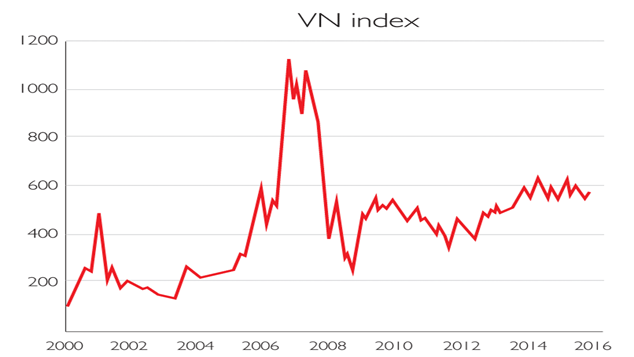Vietnam: a good bet for the long term
Vietnam is one of the most promising economies in southeast Asia. Sarah Moore looks at the best ways to invest.
Get the latest financial news, insights and expert analysis from our award-winning MoneyWeek team, to help you understand what really matters when it comes to your finances.
You are now subscribed
Your newsletter sign-up was successful
Want to add more newsletters?

Twice daily
MoneyWeek
Get the latest financial news, insights and expert analysis from our award-winning MoneyWeek team, to help you understand what really matters when it comes to your finances.

Four times a week
Look After My Bills
Sign up to our free money-saving newsletter, filled with the latest news and expert advice to help you find the best tips and deals for managing your bills. Start saving today!

Vietnam is one of the most promising economies in southeast Asia, with a young, relatively well-educated population that gives it the potential for decades of strong growth. Progress has been uneven, in part due to legacies of the country's communist era, such as bloated, inefficient state-owned conglomerates, but the economy broadly seems to be moving in the right direction.
GDP has grown by around 6.5% per year over the past decade, with the export sector playing a key role: trade has grown by around 20% per year over the same period.
Lower wages compared to China mean that Vietnam is an increasingly competitive location for manufacturing and regional free-trade agreements, such as the Trans-Pacific Partnership, should help export growth continue. Rising foreign direct investment in industries such as electronics Korea's Samsung is the country's largest foreign investor will enable the manufacturing sector to accelerate the shift from goods such as textiles and furniture to more sophisticated, higher-value industries.
MoneyWeek
Subscribe to MoneyWeek today and get your first six magazine issues absolutely FREE

Sign up to Money Morning
Don't miss the latest investment and personal finances news, market analysis, plus money-saving tips with our free twice-daily newsletter
Don't miss the latest investment and personal finances news, market analysis, plus money-saving tips with our free twice-daily newsletter
Recovering from the crash
Most importantly, the market is fairly cheap. The VN index trades on a price/earnings ratio of around 12 and a dividend yield of 4%. That makes it one of the cheaper markets globally, especially given its growth potential. In addition, the Vietnamese government recently removed some limits on foreign ownership of listed firms, which had previously been capped at 49% although this doesn't apply to state-owned companies and sectors considered "strategically important", such as banking and defence.
This may help to increase foreign investment, especially if it gives Vietnam a better chance of being upgraded from "frontier" to "emerging-market" status by index compiler MSCI and hence allows it to be included in the MSCI Emerging Markets index, the key benchmark for emerging-market investors.
A long-term holding
One way to invest is via the VinaCapital Vietnam Opportunity Fund (LSE: VOF), a closed-end fund that invests in Vietnam-listed stocks, unlisted companies and real estate. The fund has just moved from Aim, where it has been listed since 2003, to the main market. This should improve its liquidity, allow it to reach a broader investor base and lead to its inclusion in the FTSE All-Share index, says Andy Ho, VinaCapital's chief investment officer. VOF currently trades at a discount to net asset value of 26%, but this may narrow over time if interest in the fund increases.
Alternatively, larger investors could consider the PXP Vietnam Emerging Equity Fund, an open-end fund that invests almost exclusively in listed firms. The minimum investment is $100,000. For subscription details see PXPam.com.
Get the latest financial news, insights and expert analysis from our award-winning MoneyWeek team, to help you understand what really matters when it comes to your finances.
Sarah was MoneyWeek's investment editor. She graduated from the University of Southampton with a BA in English and History, before going on to complete a graduate diploma in law at the College of Law in Guildford. She joined MoneyWeek in 2014 and writes on funds, personal finance, pensions and property.
-
 Average UK house price reaches £300,000 for first time, Halifax says
Average UK house price reaches £300,000 for first time, Halifax saysWhile the average house price has topped £300k, regional disparities still remain, Halifax finds.
-
 Barings Emerging Europe trust bounces back from Russia woes
Barings Emerging Europe trust bounces back from Russia woesBarings Emerging Europe trust has added the Middle East and Africa to its mandate, delivering a strong recovery, says Max King